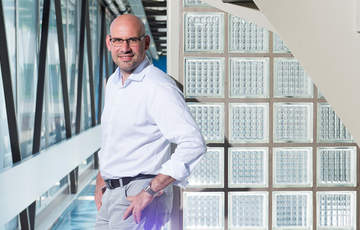
Publié il y a 9 mois
15.05.2025
Partager
It is hard to forget the year 2020 and the COVID-19 pandemic. On a global scale, the pandemic has forced many people to isolate themselves from their family, friends or colleagues. The lockdown is a thing of the past, but our memories of it remain bitter and for some, very much alive. Within the population, a widespread sense of loneliness seems to persist. According to the World Health Organisation, loneliness affects one in four seniors and is increasingly a concern for young adults whom the sanitary lockdown has weakened. On the field, health professionals are worried and find a modern society in which creating bonds turns out to be complex.
The WHO sounds the alarm
In 2023, the WHO established a commission specially dedicated to strengthening social connections, an action motivated by the urgency to come to the rescue of people who experience social isolation and loneliness. According to scientific research, isolation leads to a risk of early death equivalent to or even higher than other well-known risk factors such as alcohol, obesity, or tobacco.
One needs to be nuanced, says Armin Von Gunten, head of the Service of Advanced Age Psychiatry at CHUV. Loneliness in and of itself is not necessarily a negative thing. One can choose to isolate oneself and live well. The problem is when isolation is not a choice, and a sense of loneliness makes you suffer”. This feeling of isolation is complex because it does not only depend on the number of social relationships of an individual but also on their quality. “We can be very well surrounded but nurture superficial connections that make us feel lonely”, says Armin Von Gunten.

“From the point of view of health effects, having good friends is somehow as important as not smoking”, says Armin Von Guten, from the Service of Advanced Age Psychiatry at CHUV.
What are the health risks?
It is this imposed solitude that can reduce life expectancy. "We are, above all, social creatures," the specialist reminds us. In terms of health effects, having good friends is somehow as important as not smoking.” When social isolation leads to suffering, heart health is sometimes also at risk. "Research is looking at loneliness as a trigger for inflammation," says Baris Gencer, associate professor in the cardiology department at CHUV. The stress caused by isolation seems to activate the autonomic nervous system and an increased secretion of cortisol. Ultimately, this would lead to an increased risk of diabetes, hypertension and cardiovascular disease.”
But that’s not all. “Feelings of loneliness can induce risk behaviours for cardiovascular health by promoting, for example, a sedentary lifestyle, an unbalanced diet, poor-quality sleep, smoking or excessive alcohol consumption”, adds the cardiologist.
The loneliness of seniors
In Switzerland, the isolation of senior citizens is a public health issue. According to the Swiss Health Observatory, one in four people over 55 suffers from loneliness. People of advanced age are more affected than young seniors. Giuseppa, 84, is part of the first category. Widowed for ten years, she has suffered from loneliness after losing her husband: “I could no longer stand my evenings, my meals, waking up—all those moments when I found myself confronted with myself. The first year after his passing, I barely left my home. I was in mourning, but it’s mainly that I felt too lonely to do things”. Giuseppa had to fight against a vicious cycle: feeling lonely reinforced her desire to isolate herself from others. Depressed, she shut herself away until a friend pushed her to meet [CJ1] other people. Now, she has met women, all widows, who have become close friends.
As the octogenarian experienced, life in old age often comes with difficult farewells. “In the elderly, the loss of loved ones can cause a great sense of loneliness,” says Armin Von Gunten. But what we observe is that many elderly people manage to move forward despite everything. Their resilience plays a key role in how to cope with loneliness.”
Beyond the clichés
Seniors are far from being the only ones to suffer from social isolation[CJ1] . According to the Federal Statistical Office, nearly half of the people aged 25-39 say they suffer or have suffered from loneliness. How to explain the prevalence of these feelings in such a young population? The causes are complex, says Philippe Conus, Head of the General Psychiatry Service at CHUV. “The widespread feeling of loneliness can be linked to individual problems, but it is also related to the way our societies function.”
For the specialist, the problem is partly sociological: “Our society is highly individualistic, and it tends to make the need to share disappear. Everyone is supposed to be autonomous, manage their struggles alone, and have their private space and objects. To meet the other, you now need to take active steps. It is crucial to work on how society includes people in distress”, the specialist believes. In his practice, he observes that people who feel lonely have difficulty getting better if their surroundings – social, friends, but also professional – do not actively create a space for them by giving them an active and contributive role.
Young people are also affected
“The worse off we are, the less we have a place among others... so the worse things get, the fewer people around us and the lonelier we feel," says Louis*, 27 years old. The young man plunged into depression in 2020 during the months of lockdown. “I was still a student, he says. I had online classes, sometimes from 9 am to 5 pm. I couldn’t even go out for some fresh air. My roommate had left to live with his parents. I was alone at all times. It caused me a lot of stress, dark thoughts," he confides, preferring to remain anonymous.

Kerstin Von Plessen, from the Division of Child and Adolescent Psychiatry at CHUV, reveals that young women say they suffer more from loneliness than their male peers, particularly in relation to the difficulty of escaping gender-related injunctions.
“Many young people did not emerge unscathed from a lockdown that occurred at a key moment in their development, analyses Kerstin Von Plessen, Head of the Division of Child and Adolescent Psychiatry at CHUV. Today, in this post-COVID era, characterised by multiple crises, many teenagers, adolescent girls, and young adults look at the future with fear. This influences their ability to create connections and project themselves with others.”
In Switzerland, data on the mental health of young people is scarce, but a study conducted by Pro Juventute in 2024 addressed the issue. It reveals that young women say they suffer more from loneliness than their male peers. In her practice, Kerstin Von Plessen clearly notes an increased suffering of adolescent girls, for whom it is not always easy to free oneself from gender-related injunctions. “They do not recognise themselves in certain models dictated by society: the role of mother, wife... It’s complicated for them to build themselves from there, to know who they want to be and how to create relationships.”
The study by Pro Juventute also points to the role of social networks, which can confront young people with an unattainable ideal, reinforcing an unhealthy comparison. For the psychiatrist, social networks are at risk for the mental health of young people and can exacerbate their loneliness. Not only because they convey unrealistic ideals, for example regarding their bodies, but also because they give the illusion of a bond. “Social media is no substitute for real interactions. Nothing beats the meeting, exchange, and smiles we receive when a person really listens to us, the benevolent gaze of the other. This texture is what makes human relationships so special. Our brain, especially when it is developing, like during adolescence, needs it to be balanced. The time spent on social media mustn't be at the expense of time spent with friends and relatives in real life.”
What about remedies for loneliness? The specialists interviewed defend an approach that is both adapted to the needs of each individual and their specificities, but also focused on social infrastructures, such as common spaces in cities and access to them. In most cases, young or seniors, people experiencing loneliness did not choose to be isolated. For one reason or another, they find themselves apart from society, on its margins. Focusing on inclusion and the creation of social bonds, for example, at a local level by organising meetings in certain neighbourhoods, would then allow a place for those who suffer, while reducing the burden on the health system. These are just some of the avenues that call for a reflection, both in the medical and political spheres.
Prescriptions against loneliness
What if doctors could prescribe something other than medication? This is the principle of “social prescriptions” or “non-medicinal prescriptions,” a system that is growing in several countries.
Launched in the UK in the 1990s under the name social prescribing, this approach allows doctors to recommend social or cultural activities as a complement to more traditional medical monitoring. Now rooted in the British medical culture, social prescribing is even recommended by the country’s health system.
This approach's objectives are twofold: improving patients' mental and physical well-being and reducing pressure on the health system. In France, some municipalities, such as Montpellier, are also experimenting with cultural and sports prescription programs. More recently, "museum prescriptions" have also emerged in the country. The idea, launched by art historian Nathalie Bondil in Montreal in 2018, is to connect people who are suffering with cultural venues.
In Switzerland, the idea of prescribing activities is also gaining ground. In August 2024, the city of Zurich allowed doctors to prescribe social activities for people affected by chronic diseases or long-term Covid. These activities vary and range from gardening to classical dance classes. These prescriptions are the result of a decompartmentalised vision of medicine, where it is noted that medical and medicinal approaches are not always sufficient. This perspective, which encompasses the social component of health, gives an active role to patients in their well-being.
Source The infographics were created based on the Solitude factsheet produced by Pro Senectute in collaboration with ZHAW Zurich and the University of Geneva https://www.prosenectute.ch/fr/infos/quotidien-loisirs/solitude.html


![[Translate to Anglais:] IMAGE : iStock](https://www.invivomagazine.ch/fileadmin/documents/images/LN_INVIVO_Solitude_MINIATURE.jpg)
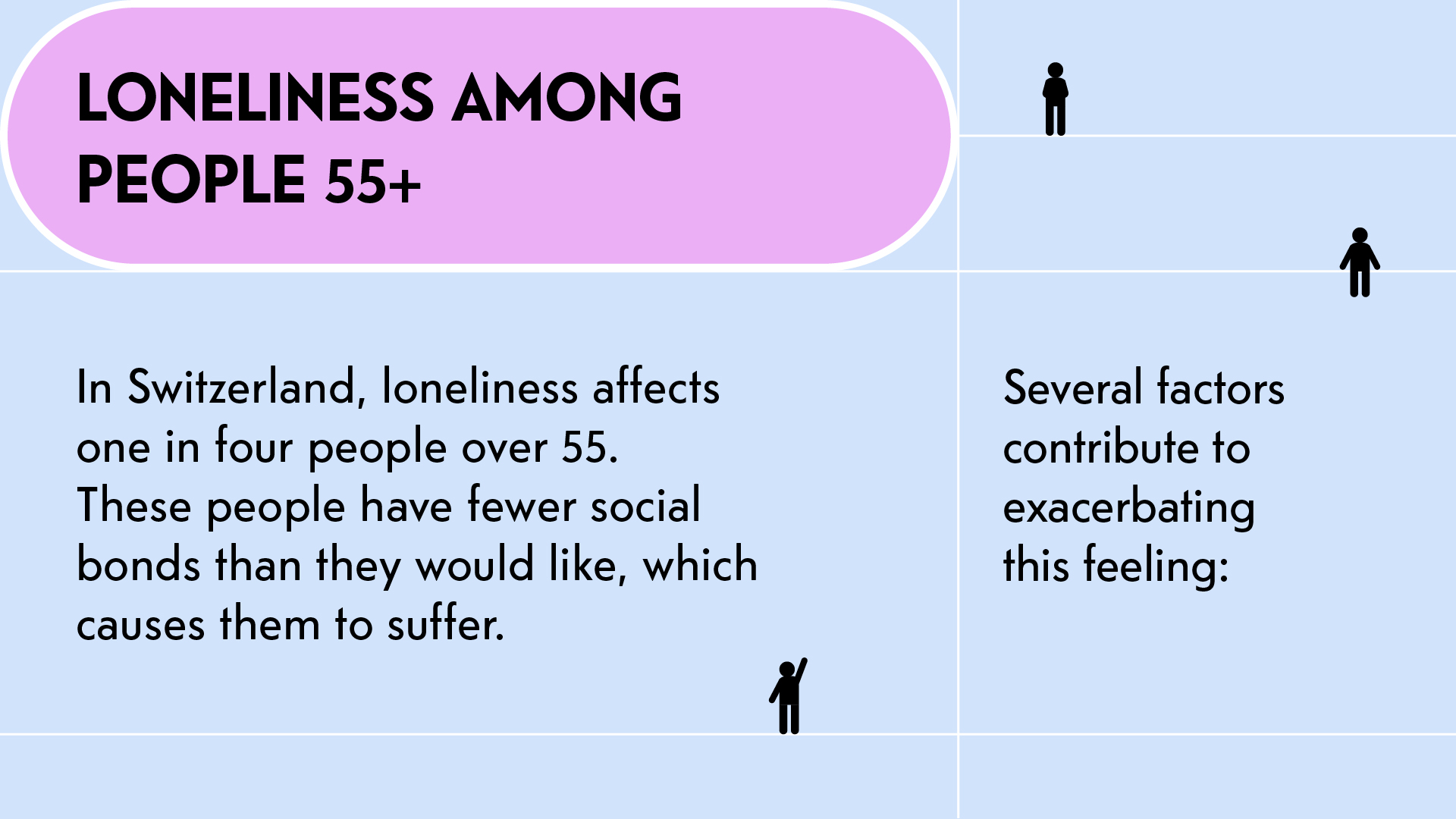
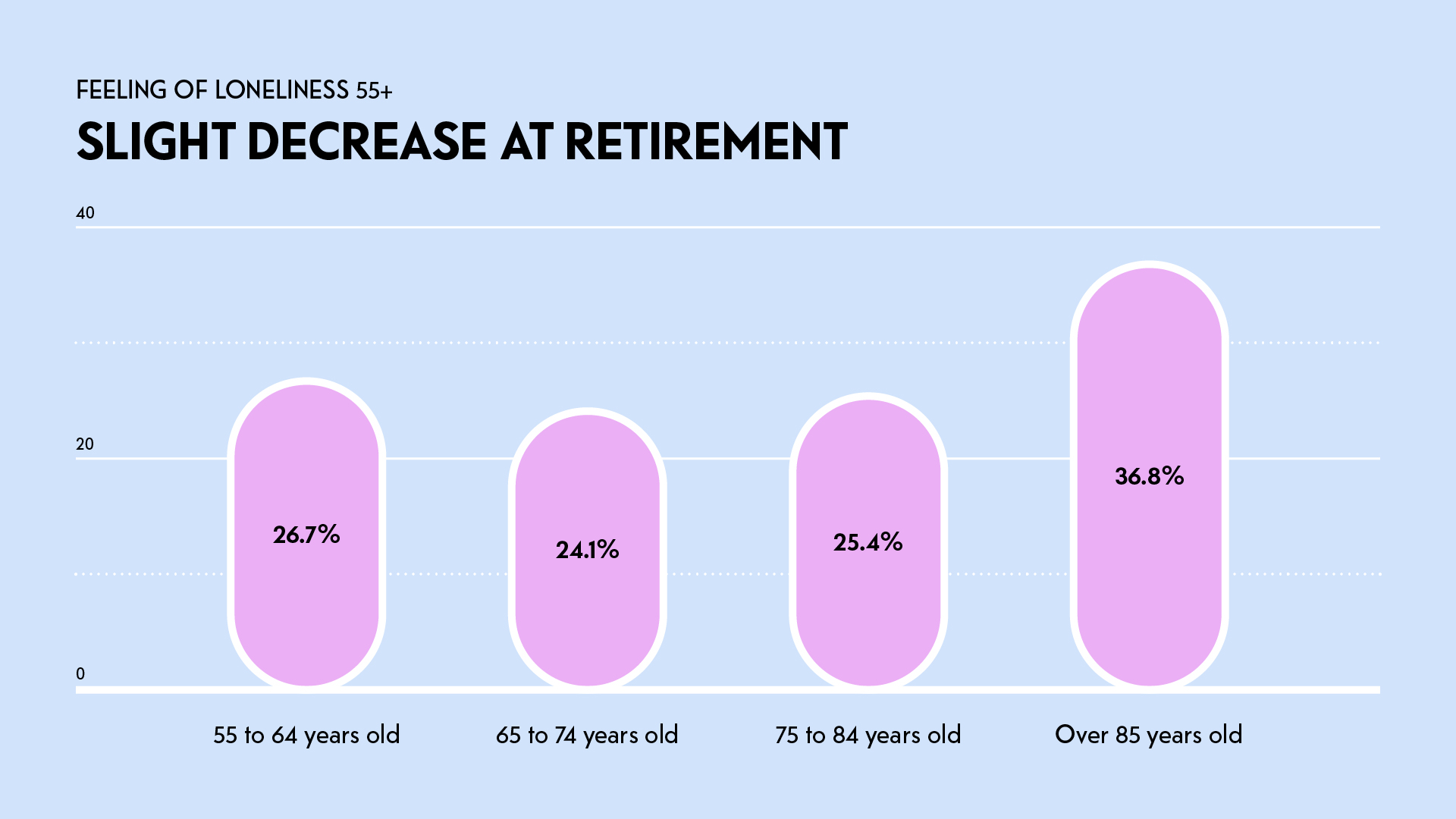
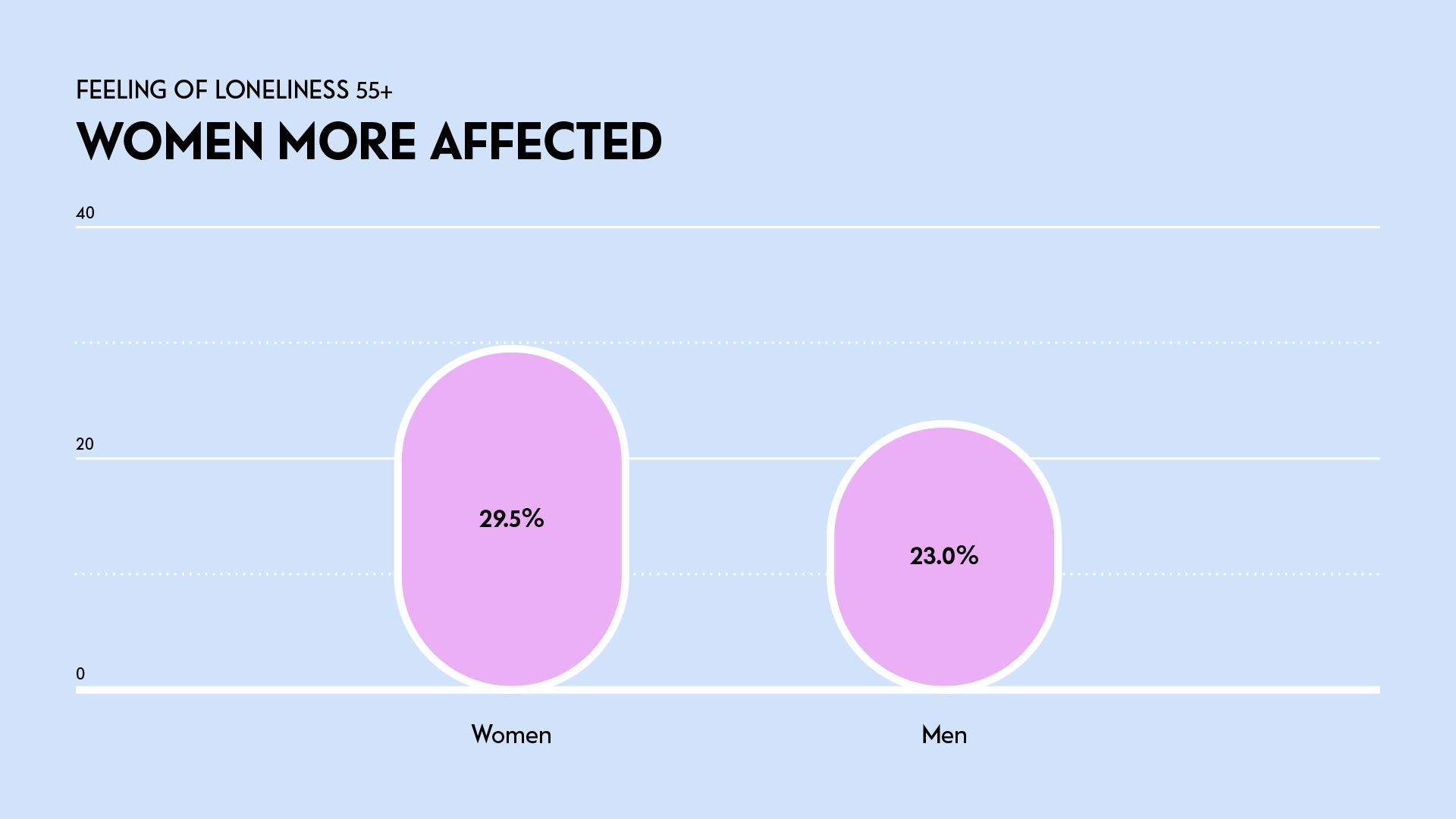
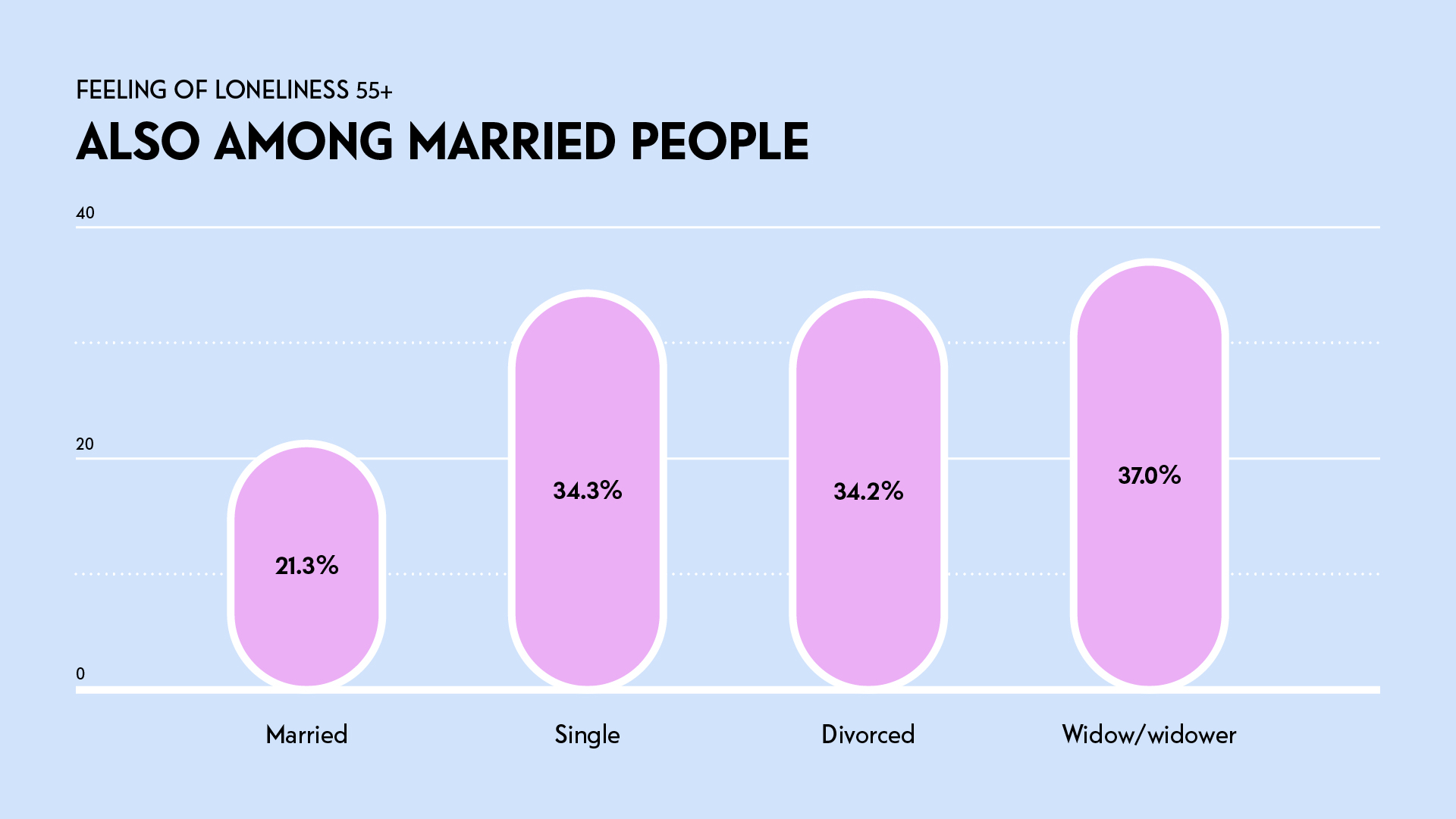
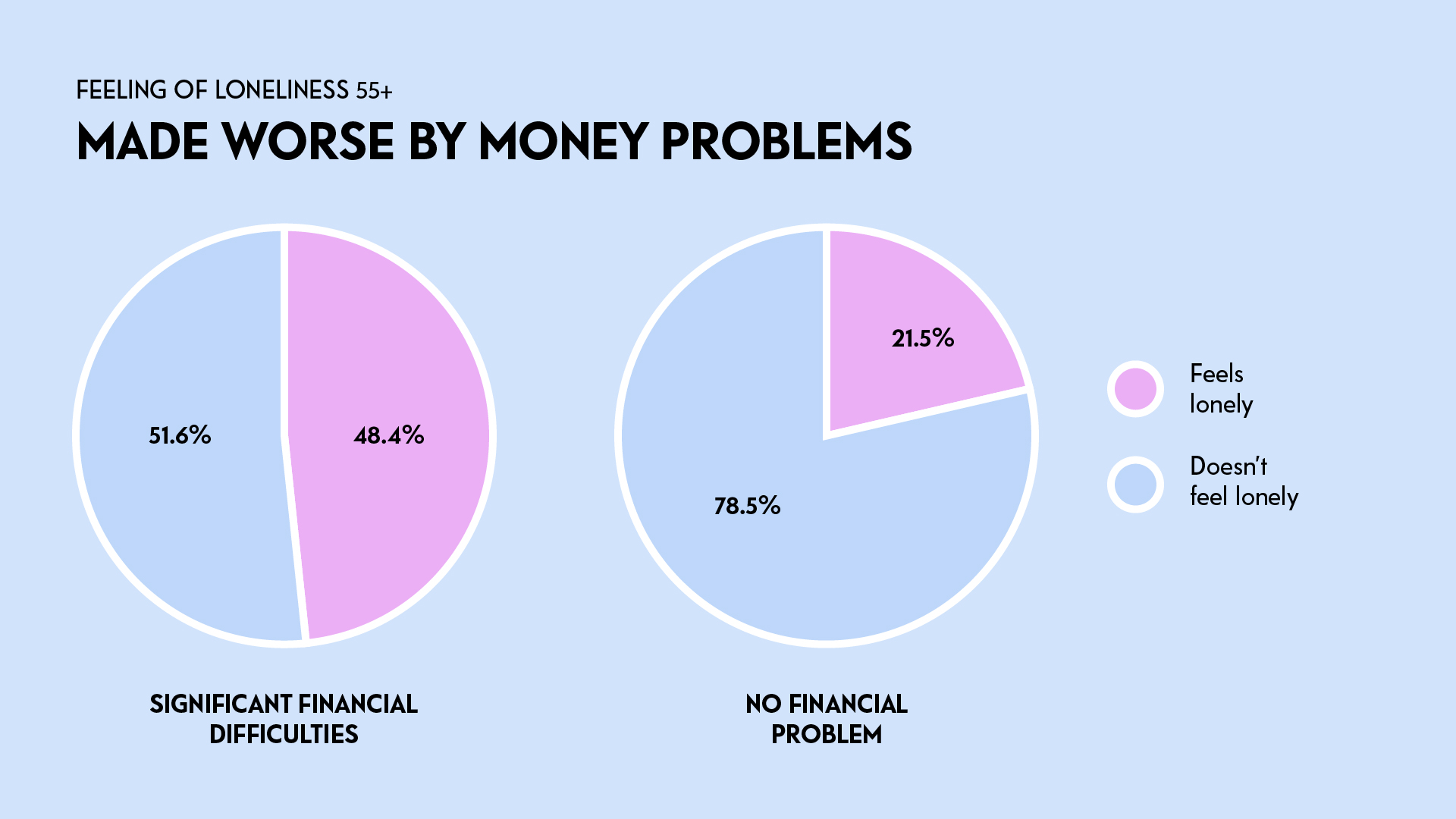
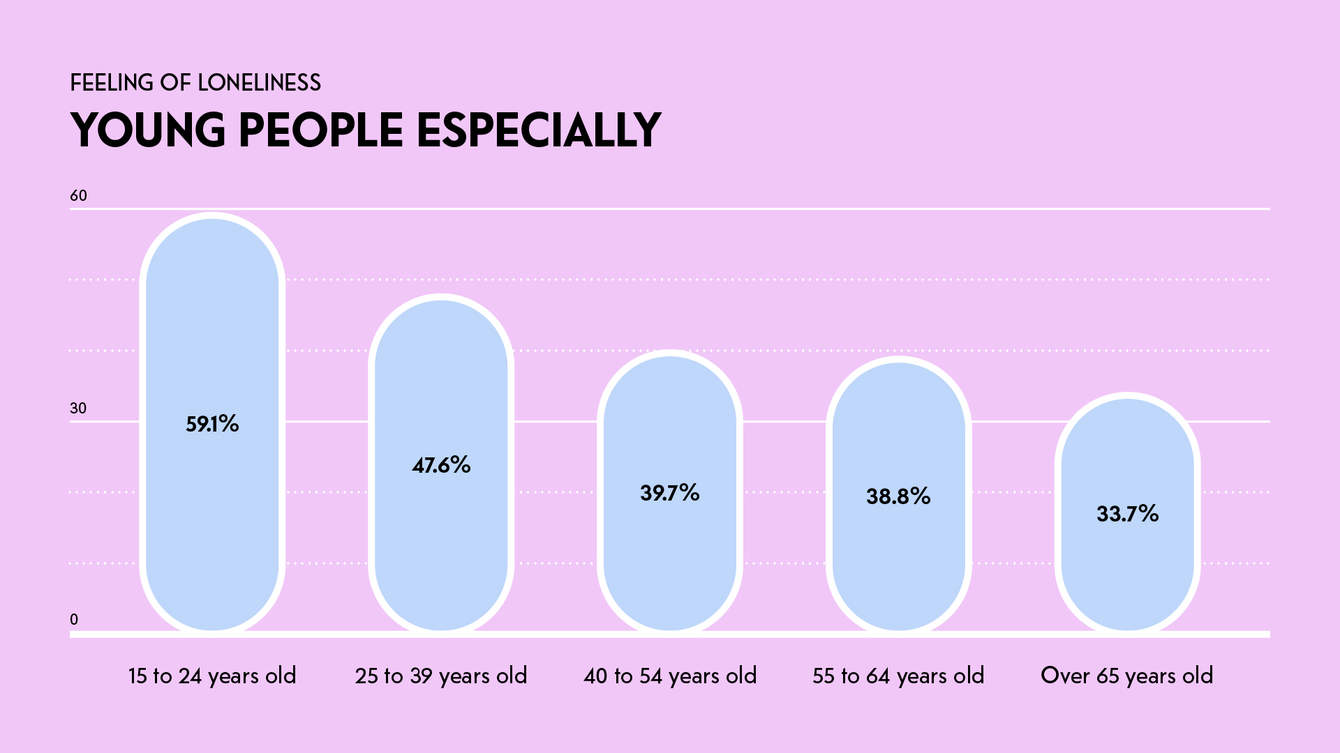
![[Translate to Anglais:] ©Large Network](https://www.invivomagazine.ch/fileadmin/_processed_/6/8/csm_LN_INVIVO_HOPITAL-FUTUR_MINIATURE_MINIATURE_337551332d.jpg)
